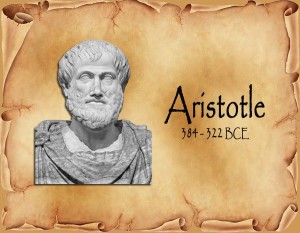Aristotle (384-322 B.C.) was born in the Macedonian city of Stagira, on the peninsula of Chalcidice (on the northern perimeter of Classical Greece). His father, Nicomachus, was the court physician to the Macedonian royal family. Aristotle was tutored privately until he was seventeen and joined Plato’s Academy (368/7 B.C.), where he remained until the age of thirty-seven. After Plato died (348/7 B.C.), he spent five years in Asia Minor and Lesbos where he devoted some time to scientific and biological observation and research. Philip of Macedon invited Aristotle to tutor his son, Alexander the Great, in 343/2 B.C., an instruction that continued until Alexander was appointed regent for his father in 340 B.C. Then Aristotle returned to Athens, and established the Lyceum (335 B.C.), a program of study for all branches of inquiry that included ethics, aesthetics, logic, physics, biology, zoology, metaphysics, poetry and poetics, theatre, music, rhetoric, linguistics, politics, government, and science.
 Aristotle, who enjoyed walking while he lectured his students, was slight of build with small eyes, thinning hair (or bald), short beard, and was said to have spoken with a lisp. A majority of his writings (referred to as “a river of gold” by Cicero) are now lost, and we have only about one-third of the original works by Aristotle (in treatise form and thought to be lecture notes for his students). Like his teacher Plato, Aristotle aims at the universal, but unlike Plato, he finds the universal in particular things, which he calls the essence of things. Aristotle’s views shifted from Platonism to empiricism, for example, Aristotle’s epistemology (theory of knowledge) begins with a study of particular phenomena and rises to the knowledge of essences. Plato’s epistemology begins with knowledge of universal Forms (or ideas) and descends to knowledge of particular imitations of these Forms. Like Socrates, Aristotle’s metaphysical inquiry is dialectical, however, unlike Socrates, Aristotle postulates a theory of efficient and final causes. Four causes were used to explain everything: the material (out of which a thing comes to be); the formal (the essence, form or definition that is introduced by the efficient cause); the efficient (which produces the effect); and the final (the purpose for which a thing exists). God was the ultimate final cause, i.e., the Unmoved Mover, but unlike our Christian God, their god had no interest in the universe.
Aristotle, who enjoyed walking while he lectured his students, was slight of build with small eyes, thinning hair (or bald), short beard, and was said to have spoken with a lisp. A majority of his writings (referred to as “a river of gold” by Cicero) are now lost, and we have only about one-third of the original works by Aristotle (in treatise form and thought to be lecture notes for his students). Like his teacher Plato, Aristotle aims at the universal, but unlike Plato, he finds the universal in particular things, which he calls the essence of things. Aristotle’s views shifted from Platonism to empiricism, for example, Aristotle’s epistemology (theory of knowledge) begins with a study of particular phenomena and rises to the knowledge of essences. Plato’s epistemology begins with knowledge of universal Forms (or ideas) and descends to knowledge of particular imitations of these Forms. Like Socrates, Aristotle’s metaphysical inquiry is dialectical, however, unlike Socrates, Aristotle postulates a theory of efficient and final causes. Four causes were used to explain everything: the material (out of which a thing comes to be); the formal (the essence, form or definition that is introduced by the efficient cause); the efficient (which produces the effect); and the final (the purpose for which a thing exists). God was the ultimate final cause, i.e., the Unmoved Mover, but unlike our Christian God, their god had no interest in the universe.
For further information, please purchase a copy of Joan’s book, Socrates, Jesus and Freedom. Copyright © 2016 by Joan Arnsteen

